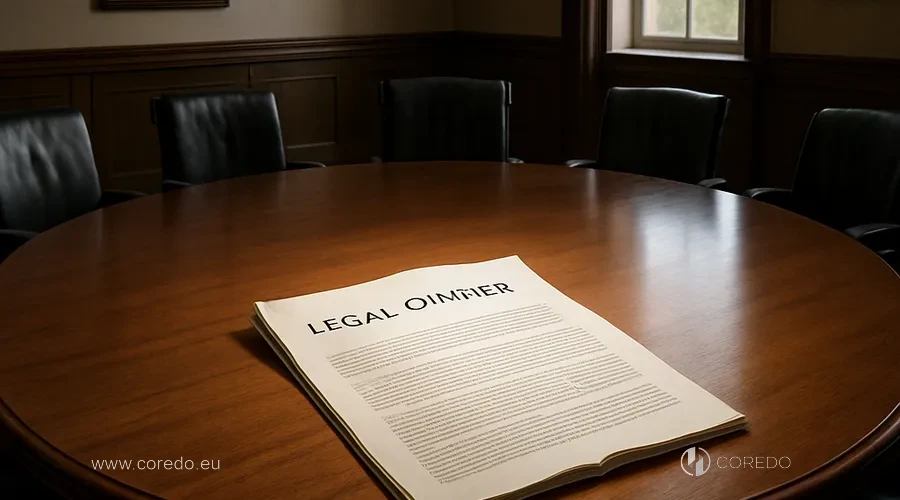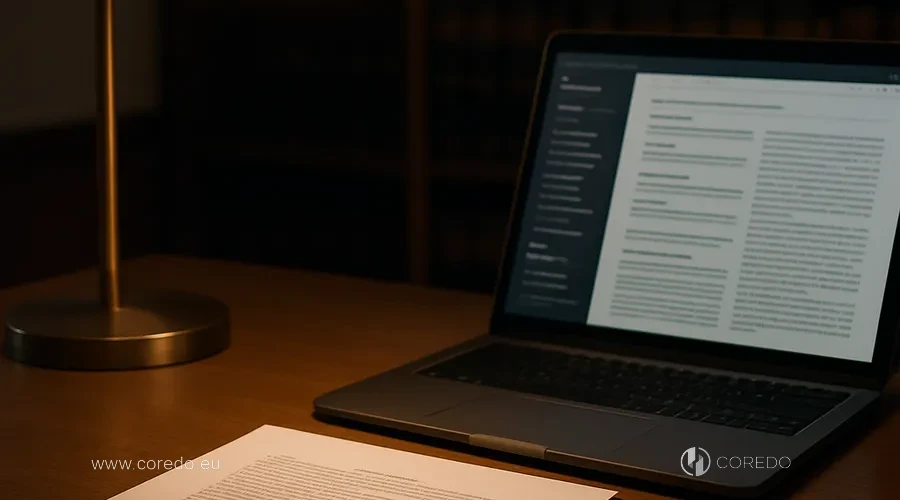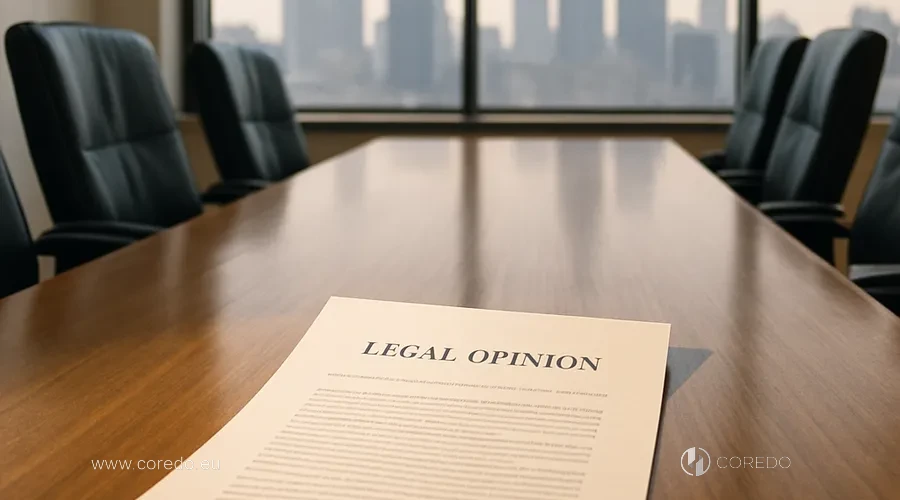Nikita Veremeev
21.11.2025 | 6 min read
Updated: 21.11.2025
Legal Opinion is an official legal opinion prepared by a qualified lawyer, containing an analysis of the company’s legal position on a specific issue: from capital structure to compliance with AML requirements and financial regulation. Unlike a consultation or an audit, a Legal Opinion has legal force and is accepted by regulators, banks and investors as evidence of a business’s transparency and reliability.
Legal Opinion becomes a mandatory element of investment activity when obtaining financial licenses (banking, cryptocurrency, forex, payment services), conducting cross-border transactions and M&A, as well as when raising venture capital and opening accounts in international banks. In these situations, a Legal Opinion protects the business from legal risks, account freezes and loss of licenses, ensuring the trust of partners and investors.
The Role of Legal Opinions in Minimizing Legal Risk

A Legal Opinion identifies hidden legal risks that can lead to significant financial losses: violations of AML and KYC procedures, deficiencies in corporate governance, conflicts of interest between beneficiaries, and non-compliance of the capital structure with regulatory requirements.
The quality of a Legal Opinion directly affects the success of an investment project. A document prepared with all the nuances taken into account minimizes risks and speeds up approval processes.
Legal Opinion in Due Diligence

Legal Opinion integrates into Due Diligence of investment transactions as a key element of legal analysis. At the stage of counterparty review, the document answers questions about the company’s compliance with legal requirements, the presence of risks related to corporate structure and sources of financing, and the possible legal consequences upon completion of the transaction.
Key elements of a Legal Opinion for investment companies

A legal opinion for an investment company should be structured and contain all necessary sections recognized by regulators and investors.
Mandatory sections of a Legal Opinion
| Section | Purpose | Key elements |
|---|---|---|
| Introduction and subject of the opinion | Define the issue and scope | Date, addressee, specific question |
| Brief summary of findings | Quick answer to the main question | Main conclusions, recommendations |
| Description of factual circumstances | Facts for analysis | Company structure, business activities |
| Applicable legislation | Specify laws and regulations | Articles, EU directives, regulator requirements |
| Analysis and rationale | Legal analysis | Interpretation of laws, case law |
| Conclusions and recommendations | Final opinion and recommendations | Answers to questions, recommendations on risks |
| Limitations and disclaimers | Limits of applicability | Qualifications, disclaimers, terms of use |
The absence of even one of these sections reduces confidence in the document and may lead to rejection by the regulator.
Specifics of a Legal Opinion on AML and finance
A Legal Opinion on AML requirements should include an assessment of the conformity of internal AML and KYC policies with international standards (FATF, 5AMLD, MiCA), an analysis of client identification procedures, transaction monitoring and risk management, and confirmation of the legalization of funding sources.
Common mistakes when preparing:
- Insufficient detail in AML procedures
- Lack of references to applicable legislation
- Vague wording without concrete conclusions
Legal Opinion in international transactions

Cross-border transactions require an in-depth analysis of legal risks and legal consequences. A Legal Opinion identifies conflicts of laws between countries, incompatibility of the corporate structure with the requirements of both jurisdictions, as well as possible sanctions and restrictions on transactions, analyzing case law and international standards.
Legal Opinion for venture capital investments
Venture capital investments require an analysis of the terms of convertible loans, options and shareholders’ agreements, an assessment of the risks of minority shareholders’ rights being violated, and recommendations on structuring the deal to minimize legal risks. A well-prepared document helps the investor decide on financing and speeds up negotiations.
Legal Opinion for M&A
In the process of mergers and acquisitions a Legal Opinion analyzes hidden liabilities and debts of the target company, the compliance of the corporate structure with regulators’ requirements, as well as possible disputes over intellectual property and contracts.
Legal opinion on obtaining financial licenses

Regulators require a Legal Opinion when licensing banks, payment service providers, and cryptocurrency platforms. The document should address the company’s compliance with legal requirements, the implementation of AML and KYC procedures, and the presence of risks of breaching financial regulation.
For crypto projects, a Legal Opinion should include an analysis of compliance with MiCA, FATF and local requirements, an assessment of ICO, STO and token transaction risks, and confirmation of the legality of the business model and sources of funding.
Step-by-step algorithm for preparing a Legal Opinion
Gathering information and defining the subject matter of the opinion includes identifying the precise question, collecting incorporation documents, registers, contracts, internal policies (AML, KYC), financial statements, beneficiary data, interviews with key employees and determining the applicable law.
Analysis of legal risks involves assessing the company’s compliance with the law, identifying gaps in documentation, reviewing corporate governance and AML analysis and KYC procedures.
Preparing a Legal Opinion includes creating a draft with a clear structure, including all mandatory sections and coordinating with the client.
Finalization requires the signature of a qualified lawyer, indication of the date and contact details, a confidentiality clause and preparation of copies for regulators.
Common mistakes when preparing a legal opinion
Ambiguous wording undermines confidence in the document. Every conclusion must be supported by references to legislation, case law and international standards.
Including a separate section on AML and compliance is a mandatory requirement. For each identified risk, specific measures should be proposed to minimize it.
Legal Opinion in different jurisdictions
| Aspect | EU (Cyprus, Estonia) | Asia (Singapore) | Africa (Mauritius) | CIS (Kazakhstan, Armenia) |
|---|---|---|---|---|
| Primary regulator | ESMA, ECB, local | MAS, ACRA, local | FSC, local authorities | National regulators |
| Requirements | MiFID II, UCITS, GDPR | Local licensing requirements | FATF standards | National legislation |
| Typical timelines | 2–4 weeks | 3–6 weeks | 2–4 weeks | 1–3 weeks |
| Cost | €3,000–10,000 | $5,000–15,000 | $2,000–8,000 | $1,000–5,000 |
Legal Opinion for the EU
The Legal Opinion should confirm compliance with EU directives, analyze corporate governance and capital structure, and also GDPR compliance.
Legal Opinion for Asia
In Singapore the Legal Opinion should take into account the specifics of local legislation, beneficial ownership disclosure and AML compliance. It is important to consider requirements for a local director and a registered office.
Legal Opinion for Africa
The document analyzes FATF compliance, sources of funding, ownership structure and links to sanctioned countries.
The impact of a Legal Opinion on attracting investment
A Legal Opinion plays a key role in attracting investment and strengthening partners’ trust by confirming the legality and transparency of the business. Investors use the document to assess the project’s transparency and reliability.
Banks require a Legal Opinion to assess the legality of the company’s structure and sources of financing. The document supports expansion into new markets, the opening of branches and subsidiaries, ensuring compliance with the requirements of local regulators.
Checklist: what to include in a Legal Opinion
- Clear definition of the subject of the opinion and the addressee
- Brief summary of conclusions
- Description of factual circumstances and the company’s structure
- Analysis of applicable legislation (references to articles)
- Detailed analysis of AML and KYC procedures
- Analysis of corporate governance and ownership structure
- risk assessment of non-compliance with financial regulation
- Analysis of contractual obligations and potential disputes
- Assessment of compliance with data protection requirements (GDPR)
- Clear conclusions and recommendations
- Limitations and disclaimers
- Signature of a qualified lawyer, date, contacts
- References to sources and documents
- Appendices (copies of key documents)
Practical recommendations
Legal Opinion – a strategic asset whose quality determines access to investments, banking services and international markets. Its quality depends on the lawyer’s qualifications and the depth of analysis. Using a structured approach and an appropriate checklist helps avoid common mistakes.
Transparency, compliance with AML and financial regulatory requirements, detailed risk analysis – the key to successful business scaling and long-term success in attracting investment and strengthening partners’ trust.